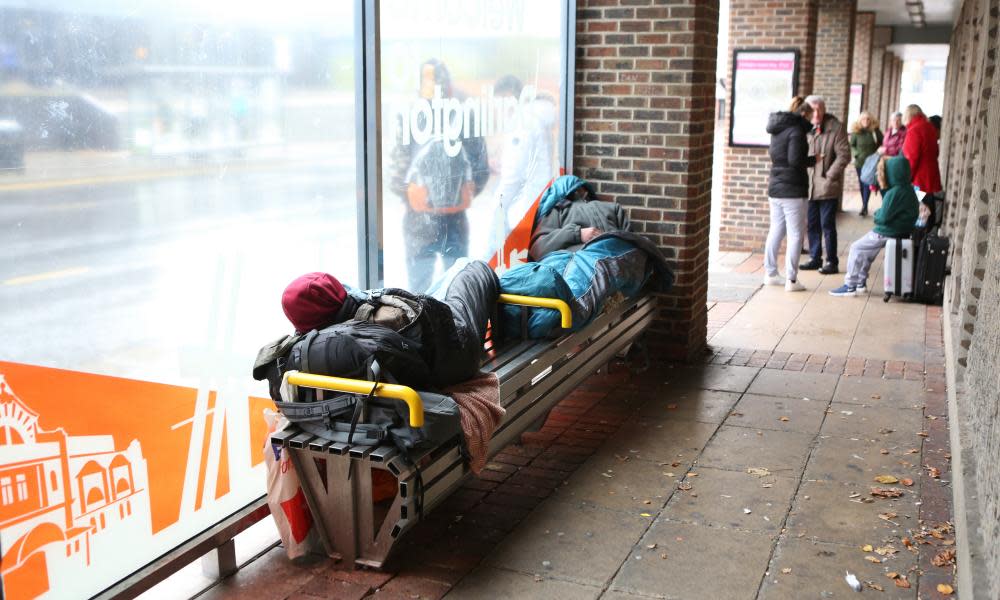This election is a chance to change society for the better. We must seize it

On the last election day, in June 2017, I volunteered as a teller at a polling station in Nottingham. Sitting in the doorway with a clipboard and a rosette, I absentmindedly read the well-worn posters stuck to the wall. As I scanned ads for literacy classes, housing rights and emergency care parcels, it dawned on me: the room in which voters were helping to elect a new government was normally a food bank.
It’s the sort of situation that seems too crass for even parody. But then if it is a joke, it’s getting old. Two years on, there are now more food banks in the UK than there are branches of McDonald’s. A four-year-old boy with suspected pneumonia has been forced to sleep under a pile of coats on a hospital floor, as thousands of patients die waiting for beds.
Related: There’s already a class war – and it’s the Conservatives who are waging it | Frances Ryan
Teachers are forced to fundraise for basic school supplies, while 1.5 million older and disabled people can’t get washed or dressed because there’s no social care. Inequality is widening, as four million people go to work only to live in poverty. On average, 183 children become homeless every day in Britain; that suggests more than 2,000 more between now and Christmas Day.
Such horrors did not appear out of the ether, but are the results of particular choices by a particular group of politicians. This is not a partisan point. It is a fact. It is not a coincidence that rough sleeping has increased by 165% since the Conservatives regained power in 2010. Almost 800 libraries have not closed themselves.
A key theme of this election campaign has been the idea that Brexit has created a despondency among the electorate – that seeming political inaction over leaving the EU has further eroded any trust and faith in the political class. This is undoubtedly true, and has played a large part in Labour’s difficulty in gaining traction in recent weeks. Faced with a public that is decreasingly convinced politics can address their concerns, it can feel hard to believe a party that is offering transformative policies. But if despondency is part of the story, we’ve heard little from the people who are crying out for change. “I don’t know what I’ll do if I wake up on Friday and the Tories have won,” is a comment I’ve heard more than once over the last few weeks.
This is not wild hyperbole but the words of people who have been pushed to the edge over the last decade and can’t take much more. Many of them are disabled or in ill health; others have faced the benefits system or seen their wages shrink month-on-month.
That Boris Johnson has barely bothered to pretend he cares somehow makes this worse still. His lies have been exposed, be it over building hospitals, or pledging to increase police numbers, when actually he intends to merely replace the ones his own party cut. His disdain for the working class (“drunk, criminal, aimless, feckless”), ethnic minorities (“piccaninnies”) and gay people (“bum boys”) is on record. Burying photographic evidence of a sick child in his pocket could hardly be a clearer symbol of what this prime minister thinks of public services or the electorate. The line by Maya Angelou comes to mind: “If someone shows you who they are, believe them the first time.”
Those formerly Labour voters who are considering taking the risk of switching to Boris Johnson “to get Brexit done” will find that – even in the next-to-impossible event that Brexit is completed quickly – once our exit from the EU is done, they will be left with years of Tory government. Listen to the Conservative candidate who last week told a hustings people use food banks because they can’t “manage their budgets”, or another who argued people with learning disabilities don’t need the minimum wage, for a warning as to where that leads.
The problem for progressives has long been that conservatism is simultaneously destructive and appealing. Hope can be scary. Empathy is difficult. This has only been exacerbated by a contest in which the Tory team has revelled in deceit and scapegoating. It is much easier to be the guy playing to the fears of your base than the one suggesting life doesn’t have to be this way.
I wonder if the polling station you go to tomorrow will be a food bank. Perhaps it will be one of the primary schools with crumbling walls. There comes a moment in every society to take a leap – for something different, for something better. A decade down the line, we have the opportunity for change, if only we seize it. Britain is now a nation of normalised failures waiting to be undone.
• Frances Ryan is a Guardian columnist and author of Crippled: Austerity and the Demonisation of Disabled People

 Yahoo News
Yahoo News 
